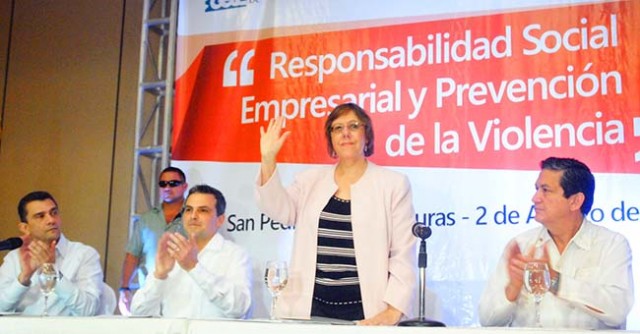[vc_row][vc_column width=”1/1″][vc_column_text]
U.S. Ambassador praises Honduras anti-violence program
By Maggie Farrand
[/vc_column_text][/vc_column][/vc_row][vc_row][vc_column width=”2/3″][vc_column_text]

Addressing an audience of prominent Honduran businesspeople, U.S. Ambassador Lisa Kubiske acknowledged key anti-violence programs and urged the private sector to continue its investments in violence prevention.
“The United States recognizes that the situation in [Honduras] is very difficult, and we support your efforts through law enforcement and prevention programs to reduce violence in your communities,” said Kubiske.
Kubiske highlighted successful initiatives that bring together government, private sector and civil society, including Creative Associates International’s Alianza Joven Honduras-USAID program.
“It is a program we fund directed towards youth. By the end of this year, we expect to create 40 outreach centers in the country’s urban neighborhoods where at-risk youth live and are at risk of falling into criminal activities,” she said.
The Alianza Joven Honduras-USAID program is a two-year initiative that addresses violence prevention through Outreach Centers and partnerships with the Government and the private sector. It is a follow-on to Creative’s successful Alianza Joven Regional USAID-SICA project that reduced insecurity at a regional level.
The Outreach Centers have reached 17,000 young people nationwide.
Now the program hopes to expand support—and ensure sustainability—by finding allies among local and national businesses.
Bringing together key actors in San Pedro Sula and in Choloma
The meetings, organized by the U.S. Agency for International Development (USAID) in alliance with Creative, were held on Aug. 2 at the San Pedro Sula’s Chamber of Commerce and Industries of Cortes (CCIC) and at the Choloma City Hall.
The events welcomed attendees from the private sector and the San Pedro Sula and Choloma Municipal Governments.
Ambassador Kubiske spoke about the importance of corporate social responsibility, urging companies to view CSR not as a mere donation, but instead as a part of their enterprise and an investment in their communities.
“Do not consider this as an extra project,” Kubiske said. “It is part of your business…it is essential.”
The Ambassador acknowledged ongoing efforts by the private sector, noting that success comes only with the involvement of the national government, local government, the private sector and civil society.
Highlighting a successful program
Business partners evaluating the risks and rewards of supporting anti-violence programs were reminded of the gains that such partnerships can offer as they listened to a presentation on the results and plans of Alianza Joven Honduras-USAID.
Under the program’s Por Mi Barrio Outreach Centers initiative, Creative has established 40 youth Outreach Centers throughout some of Honduras’s most violent neighborhoods, mostly in alliance with faith-based organizations.
Creative has recently partnered with the National Foundation for the Development of Honduras (FUNADEH) — which runs community-based development programs in San Pedro Sula.
The Outreach Centers have been successful in reducing local crime and violence by providing youth with a safe space to gather, receive training in marketable skills, access academic tutoring and volunteer.
“These outreach centers are a sanctuary for thousands of children where they can play and learn in a safe manner,” said Kubiske.
Leopold Crivelli, Choloma’s Mayor, agreed.
“The work began a year and a half ago, but the results have been shocking,” Crivelli said. “Statistics show that crime is down more than 15 percent.”
Residents in many Honduran towns will take any drop in violence they can get. In San Pedro Sula, violent crime claims the lives of 169 of every 100,000 residents annually. More than 1,200 people were killed in the city just last year, according to a study completed by the Citizen Council for Public Safety and Justice.
Thanks to these staggering statistics, San Pedro Sula regularly claims the title of world’s murder capital.
Honduras’ capital, Tegucigalpa, is currently the fifth most dangerous city in the world, with a homicide rate of 83 per 100,000 residents according to the United Nations Development Programme.
Kubiske believes it is possible to reverse the violence plaguing Honduras, especially San Pedro Sula, but only if government and private sector come together.
“I ask you to consider the value of preventing violence,” she said. “As individuals it is impossible to solve this problem; you need to find partners that can help implement these programs in neighborhoods.”
Working together for a safer future
Both Kubiske and Crivelli know that more support is needed to establish more outreach centers and continue the fight against violence in Honduras.
“We and our partners are very proud of the work done so far, but there is still so much to be done,” Kubiske said.
The Ambassador called for area employers to sponsor the operations of the youth outreach centers so they can become permanent fixtures in communities.
“We cannot do this alone, because first it is your country – not mine – and without a political agenda, without you and your employer’s efforts, there is no way to move forward,” she said. “If people and business work together, we can reduce violence.”
Since these events, several key Honduras companies and business leaders have pledged their monetary and in-kind support to the Outreach Center program, and strategic CSR alliances that involve long-term support.[/vc_column_text][/vc_column][vc_column width=”1/12″][/vc_column][vc_column width=”1/4″][vc_widget_sidebar sidebar_id=”sidebar-primary”][/vc_column][/vc_row]